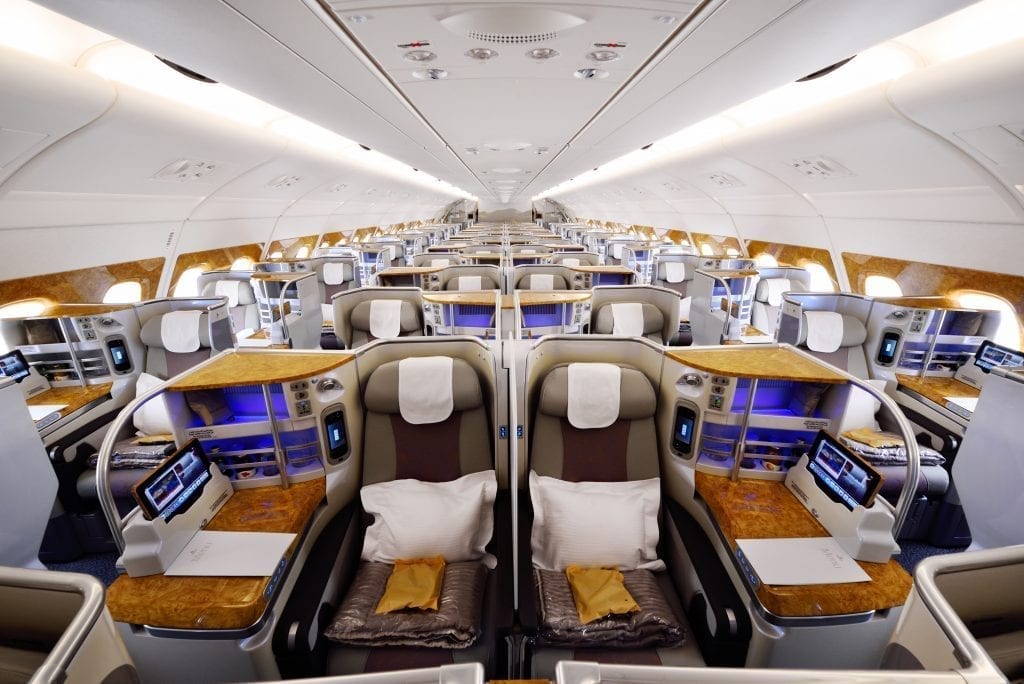The airline industry has seen a lot in terms of unbundling of economy fares. For better or for worse, that segment of the market now has a ton of options for consumers. As Skift forecasted in our 2019 Megatrend that premium mediocre has gone mainstream, travel companies — hotels, tour operators, and yes, airlines too — are increasingly looking for new ways to sell average products at luxury prices. You can buy a deeply discounted, basic economy fare that doesn’t include any overhead space, or, if you want more perks, you can pay incrementally more for priority boarding and civil treatment.
The same currently cannot be said for business class. Typically you’re all-in on the fare, sometimes as much as $7,000 from New York to Paris. In some cases it comes standard with extras, like chauffeur service and lounge access, and in other cases it comes with a sad meal in a preflight lounge and a non fully flat bed. Such is the nature of the market.
One of the most interesting assertions I’ve heard over the years is what Tim Clark, CEO of Emirates, told Skift Senior Aviation Business Editor Brian Sumers when asked of the prospect of discounting business class:
“You might just say, ‘OK, I’ll give you a special price, just for the [business-class] bed. I won’t give you the incentives. I won’t give you ground. You’ll get the business product in the air only, and that’s it.’ No chauffeur drive, no business-class lounge, no expedited [security] search. No uplifting your baggage allowance, et cetera. You just pay for the bed. I’ll give you a price for that. Maybe, if you’ve got business class seats going begging, that’s the easy way to go, rather than create a completely new product, which is going to upend the distribution systems, upend service delivery, and upend the logistical management on the operational side.”
This struck me as brilliant for a few reasons I later outlined in a column: Sometimes a traveler just needs to sleep in a flat bed, eschewing the lounge in favor of precheck or expedited boarding. Or good F&B at the airport. And when you glance around on some non-peak flights, it would appear that a lot of business seats are empty on Emirates fleet of Airbus A380s. In fact a lot of travelers I know will forego their alliance allegiances if there’s a deal. Why spend $4,000 more to fly to Africa when that EgyptAir flight with a flat bed will do the trick? Is the other stuff really worth the extra money?
Well, it appears Emirates has rolled out what they hinted at two years ago. With a new slate of fares, reported by One Mile at a Time’s Ben Schlappig, dubbed “special fares,” customers are essentially just buying the seat. There’s no lounge access (unless you qualify with status), there’s no chauffeur-driven car, there’s only selecting a seat when check-in opens, and predictably, there is reduced mileage earning.
And this strategy is brilliant.
Sure, good carriers have an image to uphold. There’s a race to show the best, most luxurious end-to-end experience. But even if this wasn’t heavily advertised and only promoted quietly, there’s a ton of merit to the idea. A bare-bones business experience for those that just need to sleep or control travel costs. By the same token, Emirates now has a product that they can upsell to economy passengers that want to take the next step. It’s worth noting that not only has Emirates rolled out this basic business-class seat but in 2020 the airline will also launch premium economy, according to Schlappig, thereby offering two different stepping stones for flyers ready to upgrade.
The no-frills business fare will certainly create a backlash for those business class flyers who aren’t paying attention to what they book, leading to potential outrage when blocked from the lounge — and there’s nothing worse than petulant, entitled customers berating staff. But that means the airline needs to clearly articulate what these lower-tier fares mean. For some travelers flying on non-fat-cat budgets, or for personal travel, I’m sure the trade-off of some of the decadent accoutrements will be more than enough if it means you can have the choice and option to fly an incredible business product, as Emirates has, at a reasonable price.
The brand is testing out the special fares on select routes and appears to be rolling them out slowly.
The knock-on effect of this will be interesting to watch. Obviously, a lot of the Gulf carriers like Etihad have been slashing their service offerings to the bone, and everyone is racing towards saner operating costs in the region. This might have a much more broad effect on business pricing. In an industry where airlines are closely monitoring the actions of others and often making changes in lockstep — note the devaluations that American carriers often carry out in sync — those without a deliberate, premium pricing strategy for their product will surely be inclined to look into unbundling their business fares, and ideally monetizing more of the empty seats when possible.
Now watch for the kabuki dance in terms of how these airlines will avoid marketing or talking about these new fares to some of their high-spending passengers, for fear of them downgrading. But overall, this is more choice for premium passengers, and I find it to be customer-centric and thus a great thing.
Subscribe to Skift Pro to get unlimited access to stories like these
{{monthly_count}} of {{monthly_limit}} Free Stories Read
Subscribe NowAlready a member? Sign in here
Subscribe to Skift Pro to get unlimited access to stories like these
Your story count resets on {{monthly_reset}}
Already a member? Sign in here
Subscribe to Skift Pro to get unlimited access to stories like these
Already a member? Sign in here
